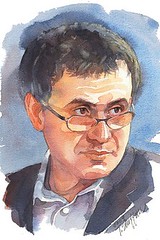Gold is a special commodity in that the fundamentals of physical supply and demand are minor influences on its price. Gold’s price is most often driven by speculative demand for a hedge against inflation or economic uncertainty. Many investors see gold as a substitute for fiat currencies. Consequently, gold prices sometimes track changes in central bank holdings of gold.Source RGE Monitor Newsletter and RGE Monitor
Gold markets largely ignored China’s surprise revelation that it had increased its gold reserves as much of this had already been priced in by speculators. Moreover, China produces its own gold. The increase in China's gold holdings is just a mere drop in the bucket of its total $1.9 trillion in foreign exchange reserves. Gold's share in China's foreign exchange reserves remains much lower than the global average and well below the U.S. share. But China's interest in gold is consistent with its taste for real assets to gradually diversify from its U.S. bond-heavy portfolio. If other central banks followed suit, gold demand could increase sharply.
IMF gold sales will likely have little impact on gold prices if it sells its gold to central banks rather than the free market. The European Central Bank Gold Agreement’s expiration in September 2009 may have more impact. The signatories are likely to renew the agreement and continue limiting central bank gold sales. Fears that monetization of rising public debts will erode currency values may spark demand for gold as an inflation hedge.
Subscribe to All American Investor via Email
 Bob DeMarco is a citizen journalist and twenty year Wall Street veteran. Bob has written more than 500 articles with more than 11,000 links to his work on the Internet. Content from All American Investor has been syndicated on Reuters, the Wall Street Journal, Fox News, Pluck, Blog Critics, and a growing list of newspaper websites. Bob is actively seeking syndication and writing assignments. Bob DeMarco is a citizen journalist and twenty year Wall Street veteran. Bob has written more than 500 articles with more than 11,000 links to his work on the Internet. Content from All American Investor has been syndicated on Reuters, the Wall Street Journal, Fox News, Pluck, Blog Critics, and a growing list of newspaper websites. Bob is actively seeking syndication and writing assignments. |
More from All American Investor
- 30 Year Conventional Mortgage Rate (Chart)
- Top Hedge Fund Managers Make Billions in 2008
- Systemic Risk Defined--Too Big to Fail
- Ray Dalio on the current state of affairs in the market
- Roubini Predicts U.S. Losses May Reach $3.6 Trillion
- Option ARM--The Toxic Mortgage
- Warren Buffett's Annual Letter to Investors (Cliff Notes Version)
Follow All American Investor on Twitter

